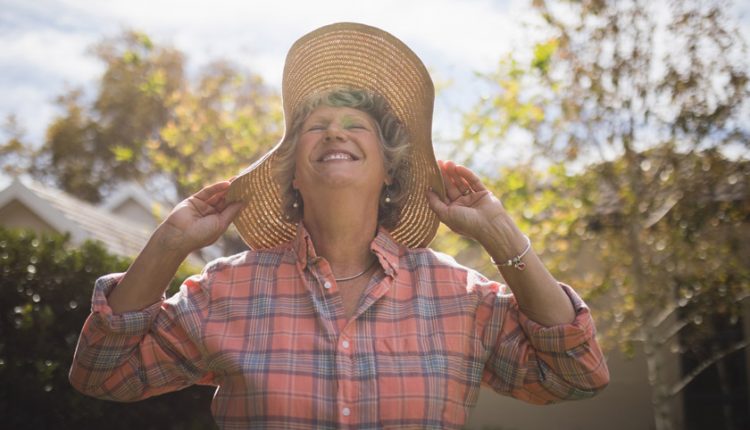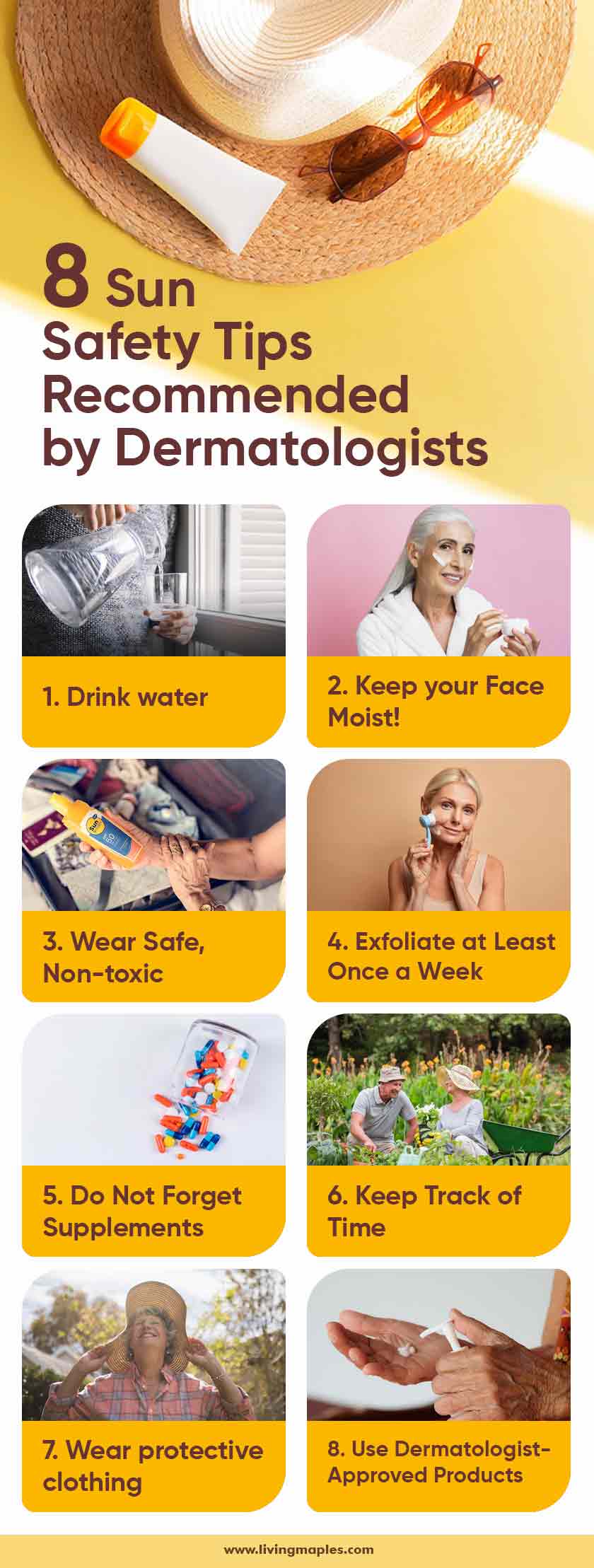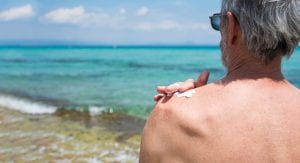
8 Sun Safety Tips Recommended by Dermatologists
Being out in the sun, walking, riding your bike or window shopping is what we consider therapy these days. But while you’re outside being physically active, it’s vital to protect yourself from the sun’s ultraviolet (UV) rays which can damage the skin in as little as 15 minutes and increase the risk of skin cancer. Sunlight is the primary source of UV rays, but you don’t have to avoid the sun completely to protect yourself; give our sun safety tips a try, and enjoy the result in a matter of months.
First Things First, What Is UV Radiation?
UV radiation is a type of electromagnetic radiation, just like light. However, it’s much more powerful and can cause various mutations. Thankfully, Earth’s ozone layer helps deflect the most damaging UV rays. It doesn’t have total coverage, though.
In addition to the risk of skin cancer, the sun’s UV rays are also responsible for more than 90% of visible changes commonly attributed to skin ageing, such as wrinkles, sagging, dryness, freckles, and dark blotches.
Sun Safety Tips for Everyone
In order to protect your skin against all the harm and damage that the sun can cause, you can follow these easy steps. In general, these are skincare tips and other valid points you need to take into account to take care of your skin and avoid the unpleasant results of too much sun exposure.
Here is everything you need to know to enjoy the sun while avoiding the damage:

1. Water, Water, Water!
Your proper body function and how fabulous or dull your skin looks are directly related to how much water you’re drinking on a daily basis.
To summarize, proper hydration flushes the toxins out of your body. Why is that important? Well, when toxins build up, they cause your kidneys to work less efficiently, which directly impacts your skin. You’ll hear a lot about drinking at least seven glasses of water daily, and we know how hard it sounds at first, but maybe you could start from 5 glasses every day and then work your way up in a month or so. It would also be best if you drank more in hot weather, particularly in summers, when the sun is trying to turn every living thing into smoke. An extra glass of water might keep your entire body hydrated.

2. Keep that Pretty Face Moist!
Always apply a quality moisturizer before sleeping; it is tempting to ease up on moisturizing since your skin may not feel as dry as it did in winter. But good moisturizers work overtime, promoting healthy skin with consistent use. You don’t stop eating well or exercising in the summer, so it doesn’t make sense to stop taking care of your skin.
In case of getting a sunburn, act fast to minimize the negative effects by moisturizing liberally and applying a homemade Aloe Vera face mask. This will keep the burned skin hydrated and soothe the discomfort in a day or two.
Also, change your heavy-duty moisturizer (used in winters) to a light, water-based moisturizer.
3. Wear Safe, Non-toxic Sunscreen
You already know this one’s importance.
The sun’s burning rays are mighty, so you need to wear an even mightier sunscreen before going out. This one is probably one of the most important sun safety tips we are recommending to you.
When choosing one, look for an SPF of at least 30 if you have fair skin and don’t be seduced by super-high SPF numbers because their total sun protection lowers as SPF increases.
Regardless of which SPF you choose, it’s best if you often reapply sunscreen every 3 hours. Use a teaspoon’s worth and apply it for at least 20 minutes before going outside.
Another smart idea would be to use SPF included makeup products to fasten the whole process.

4. Exfoliate at Least Once a Week
All those dead cells want to do is to sit on the surface of our skin, making it look dull and dry. You remove these sun-damaged dead cells by exfoliating weekly, allowing a more radiant, healthier summer skin to shine through. Exfoliating also allows our skin cells to regenerate more quickly, keeping ageing at bay. Choose a gentle, more natural exfoliator if possible, for example, something with natural exfoliating grains. You can do this before taking a shower. It is very refreshing indeed.
5. Do Not Forget Supplements
No matter how many people hate multivitamins and supplements, we all need them after a certain age. Topical vitamin C is a dermatologist-favourite ingredient that will help slow early skin ageing and prevent sun damage. Vitamin D is also necessary for your skin, along with vitamins E and K.
They saturate the tissues, including the skin and are an effective UVA/UVB shield. They also potentiate the immune system to its maximum capability.
While we’re on the subject, please keep in mind that tanning isn’t a safe way to get vitamin D.
6. Keep Track of Time
The sun’s rays are the strongest in the middle of the day, between 10 a.m. and 4 p.m. For those who love jogging outdoors, it’s best to lace up the running shoes first thing in the morning or before nightfall or maybe join a gym. This will reduce sun exposure.

7. How about Mixing Style with Protection?
Wear protective clothing, like sunglasses, hats, long-sleeved shirts and pants.
The more coverage they provide; the better protection goes to your skin. Particularly during daylight hours.
You don’t have to let go of fashion and well-liked trends because of sun exposure risks. In any case, it is possible to mix and match a good outfit that is comfortable, fashionable, and also safe enough to protect your skin from harmful rays.
8. Finally, Use Dermatologist-Approved Products
It is crucial to use products approved by dermatologists because they have proven their benefits when used before. Suppose a dermatologist has tested and approved a product. It means that the product will effectively block UVA and UVB rays and may even have extra benefits like keeping an even skin complexion or preventing signs of ageing.
Final Words
No matter what, it is never too late or too early for some sun protection. Use our dermatologist-approved sun safety tips and protect your precious skin from too much sun exposure to prevent the onset of skin cancer and sun damage.
Keeping your skin healthy will help you enjoy your senior years to the fullest!
There is a tricky point in using sunscreens. Many people think that the SPF is the only indicator of sun protection. This misbelief causes many women to use makeup foundations with the SPF instead of sunscreens. Be careful, ladies! Just because your foundation has SPF, it doesn’t mean it can protect your skin. As a dermatologist, I highly recommend you first wear sunscreen and then put on your daily makeup.
Another suggestion, To avoid any additional skin issues, know your skin type (dry, normal, oily, sensitive, or combination) before buying sunscreens, and choose the most proper one.
Do we have to wear sunscreen cream on cloudy or rainy days too? It’s generally said that UV radiation is higher in summer. Is it true?
Although this article is meant for seniors, it works for all ages. When I was in my thirties, I got terrible blisters due to being exposed to sunshine in summer without any sunscreen. So take these tips seriously if you care about your skin.